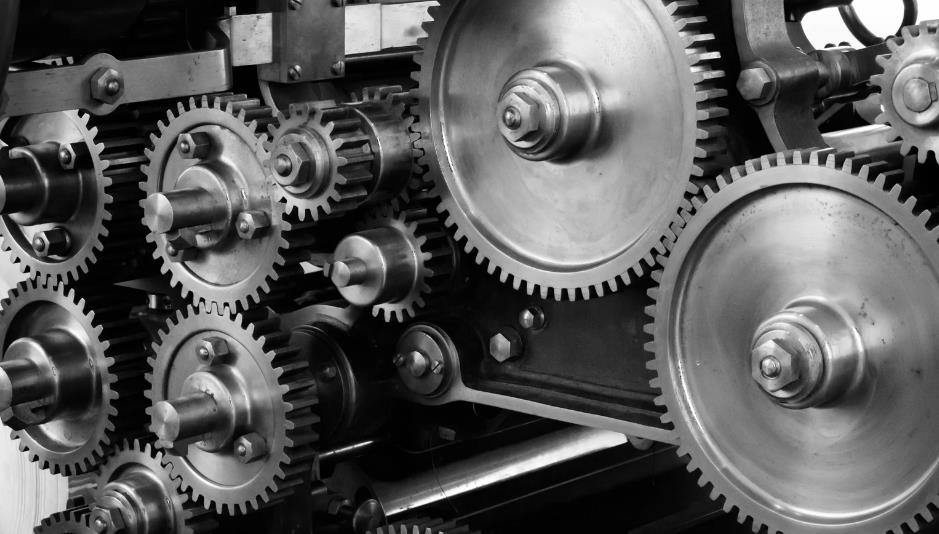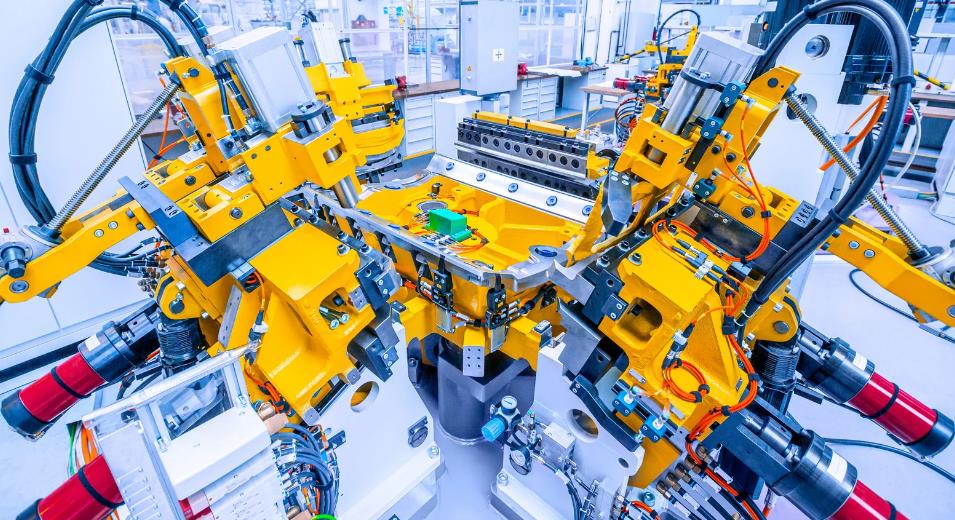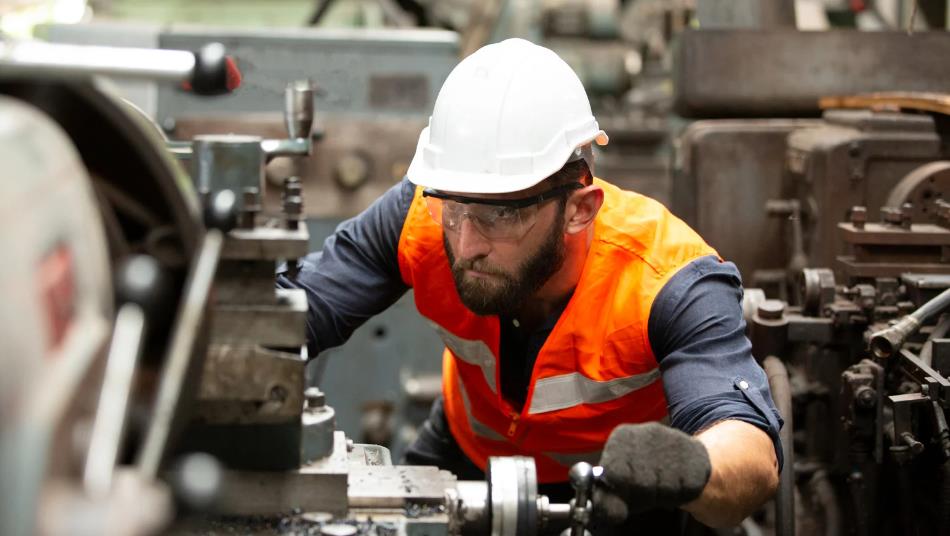Searching for a better career and confused to choose one? Here, you can find the best and growing opportunities in the industrial machinery components filed. You will get to know the top Universities, best jobs and the high paying roles about this particular field.
Industrial machinery components are essential to the production process and are used in a variety of industries. In this article, we will provide you with an overview of the industrial machinery components market, as well as the jobs available in this field.
How Many Job Are Available In Industrial Machinery Component?
In the field of industrial machinery components, there is a substantial number of job opportunities available across various roles. According to LinkedIn statistics, the job market for team assemblers is particularly strong, with around 129,480 positions available. This role involves assembling components and machinery, playing a critical part in the manufacturing process.
Other significant roles include welders, brazers, cutters, and solderers, with about 66,370 positions, and machinists, who number around 65,490. These professionals are essential for creating and maintaining the precise parts used in industrial machinery. Additionally, mechanical engineers, who are responsible for designing and improving machinery, have around 40,830 job openings.
Computer-controlled machine tool operators, who handle machines that are operated by computer systems, have approximately 31,950 positions available. Overall, the industrial machinery component field offers a diverse range of job roles, catering to various skill sets and interests, which underscores the sector’s robust employment opportunities. Besides these data, there are large number of jobs available in industrial machinery component.
Best Paying Jobs in Industrial Machinery Components
The industrial machinery manufacturing industry is responsible for producing mechanical machinery and equipment used in manufacturing, construction, and mining operations. This sector offers many high-paying jobs, ensuring that machinery is safe, efficient, and advanced. Below are 21 of the best-paying jobs in the industrial machinery manufacturing industry, along with their national average salaries:
-
Millwright
- Salary: $66,816 per year
- Duties: Building, assembling, and disassembling machinery, inspecting for flaws, and transporting equipment.
-
Warehouse Manager
- Salary: $62,901 per year
- Duties: Overseeing warehouse operations, managing inventory, and ensuring compliance with company goals.
-
Machine Operator
- Salary: $38,056 per year
- Duties: Operating and maintaining machines, performing quality control, and repairing equipment.
-
Fabricator
- Salary: $53,175 per year
- Duties: Creating machine parts, managing production schedules, and troubleshooting issues.
-
Machinist
- Salary: $61,741 per year
- Duties: Operating heavy machinery to create parts, reviewing blueprints, and programming machines.
-
Production Supervisor
- Salary: $65,861 per year
- Duties: Overseeing production, ensuring safety standards, and conducting employee assessments.
-
Industrial Mechanic
- Salary: $63,295 per year
- Duties: Repairing machinery, ordering parts, and maintaining factory equipment.
-
Industrial Designer
- Salary: $71,688 per year
- Duties: Improving mass production processes, creating blueprints, and testing products.
-
Operations Manager
- Salary: $71,166 per year
- Duties: Supervising daily operations, improving productivity, and motivating employees.
-
Assembler
- Salary: $41,878 per year
- Duties: Assembling parts, maintaining safety regulations, and communicating with production teams.
-
Quality Control Inspector
- Salary: $51,846 per year
- Duties: Inspecting equipment for quality, scheduling inspections, and reporting findings.
-
Purchasing Manager
- Salary: $79,610 per year
- Duties: Managing procurement strategies, negotiating contracts, and training buyer teams.
-
Quality Engineer
- Salary: $78,769 per year
- Duties: Developing quality processes, testing product durability, and managing production risks.
-
Industrial Engineer
- Salary: $80,816 per year
- Duties: Designing systems, monitoring machinery, and improving financial planning processes.
-
Environmental Health and Safety Specialist
- Salary: $82,744 per year
- Duties: Enforcing health and safety regulations, monitoring environmental quality, and drafting inspection reports.
-
Mechanical Engineer
- Salary: $89,424 per year
- Duties: Designing large machinery, testing systems, and investigating mechanical failures.
-
Quality Control Manager
- Salary: $86,064 per year
- Duties: Overseeing quality control processes, planning tests, and improving production quality.
-
Supply Chain Manager
- Salary: $90,713 per year
- Duties: Coordinating logistics processes, analyzing supply chain data, and resolving supply chain issues.
-
Electrical Engineer
- Salary: $95,119 per year
- Duties: Designing electrical systems, creating technical drawings, and resolving power problems.
-
Manufacturing Manager
- Salary: $94,388 per year
- Duties: Overseeing manufacturing operations, managing production projects, and ensuring safety standards.
-
Plant Manager
- Salary: $107,718 per year
- Duties: Supervising plant employees, coordinating production processes, and developing budgets.
These roles provide various opportunities within the industrial machinery manufacturing industry, catering to various skill sets and expertise levels.
Is Industrial Machinery Component a Good Career Path?
A career in industrial machinery can be highly rewarding due to its critical role in numerous industries, ensuring job security and a competitive salary. Professionals in this field can expect lucrative compensation, with salaries often ranging from $60,000 to $100,000 annually, depending on experience and specialization.
Notable universities for pursuing a degree in industrial machinery or related fields include the Massachusetts Institute of Technology (MIT), Stanford University, and the University of California, Berkeley. Key job roles include machinery design engineer, maintenance technician, and automation specialist. Top companies in the industry, such as Siemens, Caterpillar, and John Deere, offer robust career opportunities and comprehensive benefits.
The field is characterized by continuous learning and advancement opportunities, given the rapid evolution of technology. Moreover, the hands-on nature of the work and the collaborative environment can be particularly fulfilling for those who enjoy problem-solving and teamwork.
Jobs in industrial machinery components can range from positions such as mechanics and engineers to positions such as sales representatives and technicians.
If you have a degree in engineering or another related field, you may be able to find a position in industrial machinery components.
Types of Industrial Machinery Components
There are many different types of industrial machinery components, which means there are a variety of jobs available in this field. Some examples of these jobs include manufacturing parts for machines, testing equipment, and maintaining equipment.
Some common types of industrial machinery components include:
- Engineering components, such as sensors, controllers, and drives
- Machine parts, such as engines, transmissions, and gears
- Testing equipment, including meters and probe systems
- Maintaining equipment, such as filters and lubricants
Specifications for Various Machinery Parts
There are many types of machinery components that are in need of replacement or repair. With so many choices, it can be hard to know what is the best option for you.
In this blog section, we will discuss the specifications for various machinery parts and help you to choose the right option for your needs.
When purchasing a new piece of machinery, it is important to consider the specifications of the part you are purchasing. Different parts require different specifications in order to function properly.
For example, a motor might require a higher RPM than a fan belt, and a gearbox might require a higher power output than an axle.
When specifying which part you need, it is important to consult with an industrial engineer or technician familiar with the type of machinery you are using.
In this blog section, we will discuss the following specifications:
-Motor Specifications
-Fan Belt Specifications
-Axle Specifications
-Gearbox Specifications
1. Motor Specifications
When purchasing a motor for your machinery, it is important to consider the type of motor that is required. Many different motors are available for different types of machinery, and it is important to specify the type of motor that is needed for the machinery.
Some common types of motors used in industrial applications are electric motors, steam engines, and hydraulic motors.
It is important to consult with an industrial engineer or technician familiar with the specific type of machinery you are using in order to determine which motor is best suited for your application.
2. Fan Belt Specifications
When specifying a fan belt for your machinery, it is important to consider the specifications of the fan belt.
Different fan belts have different specifications in order to optimize performance and durability. Some common fan belt specifications include widths, thicknesses, and lengths.
It is important to consult with an industrial engineer or technician familiar with the type of machinery you are using in order to determine which fan belt meets your specific needs.
3. Axle Specification
When specifying an axle for your machinery, it is important to consider the specifications of the axle. Different axles have different specifications in order to optimize performance and durability.
Some common axle specifications include widths, thicknesses, and lengths. It is important to consult with an industrial engineer or technician familiar with the type of machinery you are using in order to determine which axle meets your specific needs.
4. Gearbox Specifications
When specifying a gearbox for your machinery, it is important to consider the specifications of the gearbox. Different gearboxes have different specifications in order to optimize performance and durability. Some common gearbox specifications include widths, thicknesses, and lengths.
It is important to consult with an industrial engineer or technician familiar with the type of machinery you are using in order to determine which gearbox meets your specific needs.
What Companies are in the Industrial Machinery Component field?
The industrial machinery component field in the U.S. is home to some prominent companies that manufacture a wide range of essential machinery and components for various industries. FCA US, LLC in Auburn Hills, MI, with 15,000 employees, is well-known for its automotive innovations, including self-driving technology.
The Naval Surface Warfare Center in Crane, IN, employs 5,000 and focuses on naval prototypes and special warfare weapons. John Deere Waterloo Works in Iowa, with 4,200 employees, is a significant hub for tractor transmissions and OEM components. General Motors Global Propulsion Systems in Pontiac, MI, employs 4,000 to develop engines and transmission prototypes.
Rolls-Royce Corp. in Indianapolis, IN, is renowned for its turbine engines for aerospace, marine, and energy markets, employing another 4,000. Lancer Corp. in San Antonio, TX, produces beverage dispensing equipment and employs 3,858. GE Power Electronics, Inc. has significant facilities in Schenectady, NY, and Greenville, SC, with 3,740 and 3,400 employees, respectively, focusing on industrial and utility steam turbines and gas turbines.
Honda Of America Mfg., Inc. in Anna, OH, employs 3,500 and focuses on automotive engine manufacturing. These companies are integral to the industrial machinery sector, contributing to advancements in automotive, energy, aerospace, and more. Besides these, there are so many companies that offer the best jobs in the industrial machinery field.
What do Industrial Machinery Components Jobs Pay?
Jobs in the industrial machinery components sector offer a wide range of salaries depending on the role and experience level. Entry-level positions, such as assembly line workers, typically earn around $30,000 to $40,000 per year.
Technicians and machine operators can expect to make between $40,000 and $60,000 annually. More specialized roles, like industrial engineers and quality control inspectors, usually earn between $60,000 and $90,000 per year. Senior positions, such as plant managers or engineers with advanced expertise, can see salaries ranging from $90,000 to over $120,000 per year.
The Labor Market for Industrial Machinery Components

The labor market for industrial machinery components is competitive, and there are many opportunities available. The most in-demand jobs include mechanics, welders, and machinists.
These workers need to have a good understanding of industrial machinery and be able to repair or maintain it. Other in-demand jobs include sales representatives, lab technicians, and engineers.
The Future of the Industrial Machinery Components Industry
The industrial machinery components industry is showing positive signs of growth.
According to a report by the International Association of Machinists and Aerospace Workers (IAM), the industry has created 106,000 jobs in the past decade. Addition of new production facilities and an increase in demand for equipment are responsible for this growth.
Today, there are numerous opportunities available in the industrial machinery components industry. Jobs in this sector include technicians, engineers, and managers.
Many careers in industrial machinery components require a degree in engineering or technology. However, there are also entry-level positions available that do not require a college degree.
In fact, many companies are looking for candidates with prior experience working with industrial machines.
If you are interested in a career in industrial machinery components, don’t wait to explore your options. There are many great opportunities available today, and the industry is growing rapidly!
What is industrial machinery and components?
Industrial machinery refers to a wide range of machines and equipment used in manufacturing, processing, and other industrial sectors. Common types of industrial machinery include:
-CNC machines:
These machines use digital controls to make precise movements and cuts in metal, plastic, or other materials.
-Welders:
Welders use heat and sparks to connect two pieces of metal together.
–Lathes:
A lathe is a machine used for turning objects round by rotating them on an axis. It can be used to create parts for industrial machinery, or to shape objects such as wood.
-Machines that cut materials:
This category includes saws, routers, and other tools that cut through different materials using a rotating blade.
Industrial components are the mechanical and electronic parts that go into industrial machinery. They can be made from a variety of materials, including metals, plastics, and composites.
Components come in many shapes and sizes, and must be compatible with the specific type of industrial machinery they will be used with. Some common components include motors, drive belts, bearings, sensors, controllers, and valves.
There are a wide variety of jobs available in industrial machinery components. Most jobs involve working with machines and components, but some jobs also require special skills, such as welding or programming.
What do Industrial Machinery Components Jobs Pay?
Jobs in the industrial machinery components sector offer a wide range of salaries depending on the role and experience level. Entry-level positions, such as assembly line workers, typically earn around $30,000 to $40,000 per year.
Technicians and machine operators can expect to make between $40,000 and $60,000 annually. More specialized roles, like industrial engineers and quality control inspectors, usually earn between $60,000 and $90,000 per year. Senior positions, such as plant managers or engineers with advanced expertise, can see salaries ranging from $90,000 to over $120,000 per year.

Frequently Asked Question
Here are some of the frequently asked questions related to the article How many jobs are available in industrial machinery components:
1. What is machinery and equipment industry?
The machinery and equipment industry is one of the largest in the United States. Manufacturing and construction account for the bulk of its activity, but the industry also includes a wide range of services such as maintenance, repair, and overhaul (MRO).
Machinery and equipment manufacturing is a global business with more than $1 trillion in annual sales. The United States is by far the largest producer and consumer of machinery and equipment in the world. In 2017, exports amounted to $446.3 billion, while imports totaled $481.5 billion.
The United States also has a strong industrial base, with over 1 million manufacturing establishments employing over 12 million people. These establishments produce a wide variety of products from aircraft and automotive parts to medical devices and agricultural equipment.
2. What are the major types of machinery?
The major types of machinery include industrial plants, production systems, process management, plant layout and operation, product quality assurance/control systems, energy use in manufacturing facilities
3. What is an example of industrial equipment?
An example of industrial machinery is a printing press.
4. Who were employed to work on machines?
Industrial machinery components are usually made up of a variety of different parts that need to be assembled and fitted together. This means that a large number of people are employed to work on these machines.
The people who are employed to work on industrial machinery components generally have a variety of skills and qualifications. They may have experience working with specific types of machines or they may have the skills and training needed to assemble and fit the components together.
In general, industrial machinery components require people who have a strong knowledge of how the machines work. They also need people who have good skills in problem solving and building teamwork.
